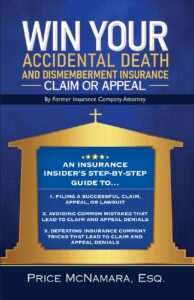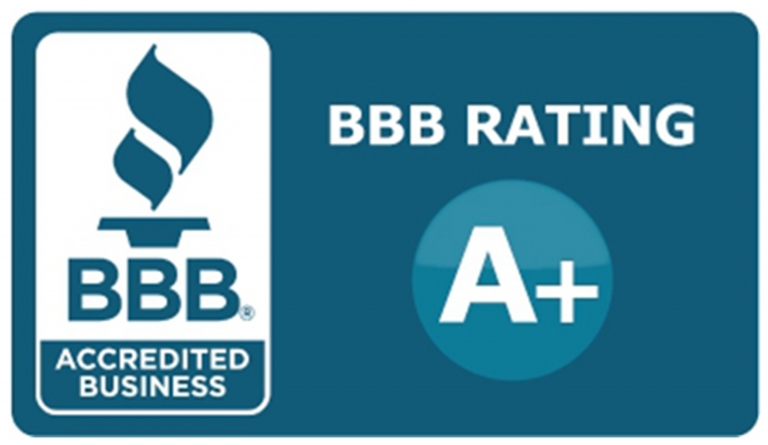You might have filed an accidental death and dismemberment (AD&D) insurance claim, only to learn the insurer denied that claim. Now you’re in a panic and don’t know where to turn.
Dallas accidental death and dismemberment insurance attorney J. Price McNamara can help. He has more than three decades of experience helping people in the same situation and is ready to put that experience to work for you.
Dallas accidental death and dismemberment insurance Guide
- Why Choose Our Dallas Accidental Death and Dismemberment Insurance Lawyers?
- The Basics
- A Closer Look at Employer-Provided AD&D Insurance
- Common Reasons for AD&D Claim Denials
- How an Attorney Can Help With Your Denied Claim
- What to Expect if Your Case Goes to Trial
- Contact J. Price McNamara to Schedule a Consultation
Why Choose Our Dallas Accidental Death and Dismemberment Insurance Lawyers?

Dallas accidental death and dismemberment insurance attorney J. Price McNamara has devoted his life to helping people who’ve received the troubling news that an insurance company has denied their legitimate AD&D claim.
These claimants are going through enough already. They don’t need the added stress and anxiety of a denied claim.
With years of experience handling complex ERISA claims, McNamara and his team bring a deep knowledge of federal regulations and strategic insight into the claims process.
Their personalized approach ensures they handle every case with attention to detail and a commitment to securing the best possible outcome. McNamara’s dedication to client advocacy and his thorough understanding of ERISA law make him a formidable ally in helping clients overcome the challenges of insurance claims and appeals.
The Basics
Many people file AD&D claims through either their employer or the employer of their lost loved one. When this happens, claims typically fall under the Employee Retirement Income Security Act of 1974.
ERISA covers AD&D policies, as well as disability and life insurance plans many employers offer.

ERISA sets the standards for most voluntarily established health and retirement plans in private industry, including AD&D insurance.
It requires plans to provide participants with plan information, uphold fiduciary responsibilities, and establish a claims and appeals process for participants.
However, when an insurer denies a claim - a common scenario - you face an intricate and demanding process of challenging such decisions.
In instances like this, a skilled Dallas accidental death and dismemberment insurance attorney can help you.
An experienced lawyer can handle all the complexities associated with federal regulations, providing a tailored legal strategy to challenge unfair denials effectively and restore the benefits to which you’re entitled.
A Closer Look at Employer-Provided AD&D Insurance

Employer-provided AD&D insurance is a form of coverage that compensates employees or their beneficiaries if the insured’s accidental death or a severe injury that results in dismemberment.
This type of insurance is distinct from life insurance, as it only pays benefits for accidents, not natural deaths or illnesses. Companies typically offer AD&D insurance as part of an employee benefits package, either as a standalone policy or integrated with a life insurance plan.
AD&D policies generally cover a predefined amount for the loss of limbs, sight, or other physical functions, with the benefit for accidental death usually matching the policy’s principal sum.
The specifics of coverage can vary, but most plans include a schedule of losses that stipulates the amount payable for the loss of specific body parts or functions.
For instance, the loss of an eye might recover 50 percent of the principal sum, while the loss of two limbs might result in 100 percent payment. The policy might exclude anxiety but not the disabling digestive problems it can cause. It can exclude diabetes but not the debilitating heart conditions it causes.
In addition, AD&D policies often exclude certain types of incidents, such as those resulting from high-risk activities or pre-existing health conditions.
Where ERISA Fits In
ERISA plays a significant role in these policies. As a federal law, ERISA governs the administration of employer-provided health and retirement benefits, including AD&D insurance. It sets forth requirements that plans must follow regarding funding, benefit accrual, and fiduciary responsibilities.
For AD&D insurance, ERISA mandates transparency in plan information, ensuring that employees are well-informed about policy terms, coverage limits, and exclusions. It also provides a framework for the claims process, detailing how employees can file claims, appeal denied claims, and the timelines involved.
By standardizing these processes, ERISA strives to protect the rights of employees under employer-provided AD&D insurance plans. It doesn’t always work out that way, so hire a lawyer today.
Common Reasons for AD&D Claim Denials

Insurers deny AD&D claims for several reasons, leaving beneficiaries puzzled and frustrated. One common reason for denial is disputes over the cause of death or injury.
Insurance providers may argue that the death or injury didn’t directly occur due to an accident. The insurer may argue that it falls under the scope of policy exclusions, such as death caused by drug overdose or incidents involving illegal activities.
Why Exclusions are Essential to Understand
Policy exclusions are essential in AD&D claims.
These exclusions often include deaths resulting from:
- Natural causes, illnesses, or surgeries.
- Injuries sustained while the insured was committing a crime.
- Accidents occurring under the influence of non-prescribed drugs or alcohol.
In addition, standard AD&D policies might not cover high-risk activities such as skydiving, car racing, or other extreme sports.

Under the ERISA framework, insurers must clearly communicate the reasons for denying an AD&D claim.
ERISA requires that all denial letters explain the specific reasoning behind the decision, reference the particular sections of the coverage policy relevant to the denial, and inform the claimant about their right to appeal the decision.
These explanations provide transparency and ensure that the claimant has a fair opportunity to understand and contest the denial.
ERISA also dictates a stringent timeline for the claims process, requiring that insurers review claims and appeals within specified time frames to prevent delays in the adjudication process.
This oversight holds insurance providers accountable, ensuring they adhere to fair practices in evaluating claims and communicating their decisions.
Anyone involved in the AD&D claims process needs a lawyer who understands these elements, particularly when confronting a denial that may seem unjust or unclear.
How an Attorney Can Help With Your Denied Claim

Dallas accidental death and dismemberment insurance attorney J. Price McNamara deeply understands the impact deadlines have on the ERISA claim process. He also knows how to fight if an insurer unfairly denies a legitimate AD&D claim. These are a few of the ways he can help if you’re in this unfortunate situation.
The Initial Assessment and Denial Letter Review
Your Dallas accidental death and dismemberment insurance attorney will review the insurer’s denial letter thoroughly. This document outlines the reasons for the denial, referencing specific policy provisions and the factual basis for the decision.
Your lawyer will assess the validity of these reasons against the backdrop of the policy details and ERISA regulations. This review determines if your appeal will succeed and will also identify any procedural errors or misinterpretations of the policy terms by the insurer.
Gathering and Organizing Additional Evidence to Support the Appeal
A Dallas accidental death and dismemberment insurance attorney will gather and organize compelling evidence that supports your claim. For example, your lawyer may obtain detailed medical records, expert testimonies, accident reports, and other relevant documents the insurer either undervalued or failed to consider during the initial claim assessment.
Your attorney will present relevant evidence in a manner that is most likely to influence the decision makers. The objective is to construct a strong argument that counteracts each stated reason for the claim’s denial.
The Appeals Process

Your Dallas accidental death and dismemberment insurance attorney will handle all aspects of filing the appeal, including preparing and submitting all necessary paperwork. This involves drafting a comprehensive appeal letter that clearly articulates the grounds for the appeal, backed by evidence and legal arguments.
Your lawyer will file the appeal within the ERISA-mandated deadline, typically 180 days from the receipt of the denial notice.
Representation During the Review
Throughout the appeals process, your Dallas accidental death and dismemberment insurance attorney will advocate for you, communicate with the insurance plan’s administrators, and negotiate whenever possible.

Your lawyer will also prepare for the possibility they may need to escalate the appeal to a lawsuit if the insurer fails to resolve the claim in your favor. This representation will clearly and professionally articulate your claim’s legal and factual basis.
Going to Court
If the internal appeal does not resolve the issue, a Dallas accidental death and dismemberment insurance attorney can represent you in a lawsuit against the plan under ERISA. This legal step involves presenting the case in federal court, which requires your attorney’s experience in ERISA law, procedural requirements, and strategic litigation skills.
The guidance of a skilled lawyer through this process not only enhances the likelihood of a successful outcome but also protects your rights.
What to Expect if Your Case Goes to Trial

When an insurer denies your ERISA-regulated AD&D claim and your Dallas accidental death and dismemberment insurance attorney has exhausted all internal appeals without resolution, the next step is to consider legal action. This marks the transition from administrative remedies to the judicial process, which involves several distinct steps under ERISA regulations.
Here are a few of those steps.
- Initiating litigation: Litigation under ERISA starts with your lawyer filing a lawsuit in federal court. They can only take this action after exhausting all available administrative appeals. The reason is that, according to the law, the plan administrator must have the chance to rectify any wrongful denials internally. When filing the lawsuit, your attorney must present a well-documented case, including all correspondence related to the claim and denial, the plan documents, and the administrative record from the appeal process.
- The court process: Once your Dallas accidental death and dismemberment insurance attorney starts litigation, the process moves through several stages. These stages include filing motions, discovery, and potentially a trial. However, ERISA litigation is unique. It often limits the scope of discovery to the evidence available to the plan administrator at the time of the final decision. This means the court can review the case based on the administrative record alone without considering new evidence. This process is known as a paper review.
- Potential outcomes: The outcomes in ERISA litigation can vary. The court may decide to uphold the denial of benefits, reverse the decision, or remand the case back to the plan administrator for further review under correct legal standards. In some cases, if the court finds that the plan acted arbitrarily or impulsively, it may award the claimant their benefits and potentially attorney’s fees and interest.
During the court process, you should prepare for a scenario that relies heavily on legal arguments rather than factual disputes. That’s one of the many reasons why you need a seasoned Dallas accidental death and dismemberment insurance attorney like J. Price McNamara.
Contact J. Price McNamara to Schedule a Consultation

Dealing with the complex landscape of ERISA and employer-provided AD&D insurance claims can be impossible, especially if the insurer denies your claim. You’re already suffering terribly - you don’t need the added burden of handling this problem alone.
Understanding your rights under the policy, the nuances of ERISA regulations, and the necessary steps in the appeals process are crucial to securing the benefits you deserve.
However, it’s all too much for a non-attorney to navigate successfully. If the insurer denies your claim, you’ll need the guidance of Dallas accidental death and dismemberment insurance attorney J. Price McNamara.
We’ll join you every step of the way through this challenging journey alone. We have the experience and resources to provide the support and advocacy you need to challenge the denial and fight for your rights. Call us at (713) 300-0462 or use our online form to set up your free consultation now.
Contact J. Price McNamara as soon as possible to review your case and explore your options. He’s helped clients obtain millions of dollars in compensation and will work hard to do the same for you.

